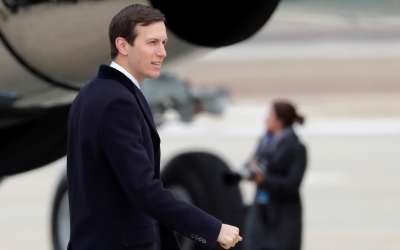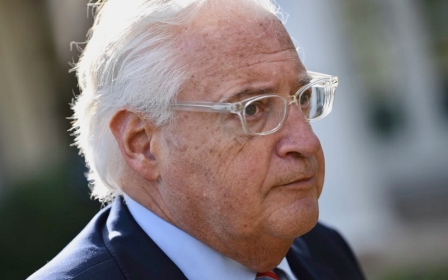Advocates reject proposed US business fund as way to thwart Palestinian rights

Just weeks before Jared Kushner's economic workshop begins in Bahrain, Palestine advocates in the United States have decried a bill they say aims to silence Palestinian demands for self-determination through financial incentives.
US lawmakers introduced a bill, dubbed the Partnership Fund for Peace, on 5 June to encourage cooperation between Palestinian and Israeli businesses.
The legislation would establish a $50m-a-year fund to "promote joint economic development and finance ventures between Palestinian entrepreneurs and companies and those in the United States and Israel".
But the bill has been rejected by some Palestinian rights advocates, who called it an extension of the Trump administration's efforts to buy off Palestinians.
"Without true freedom and total liberation of the land across classes in Palestine, a little bit of investments is not going to bring about what the Palestinian people want or what they need," said Hatem Abudayyeh, co-founder of the US Palestinian Community Network.
Abudayyeh said the proposed fund falls within the "logical framework" of Kushner's so-called "deal of the century".
Donald Trump's son-in-law, who also serves as the US president's Middle East policy adviser, has emphasised economic prosperity for Palestinians as a key element of his plan to end the Israeli-Palestinian conflict.

While hardly any details of the deal have been unveiled, the Trump administration is hosting an economic workshop in Manama later this month to discuss ways to revive the economy in the occupied Palestinian territories.
But Washington has struggled to garner support for the upcoming meeting, with Palestinian political and business leaders already saying they intend to boycott the summit.
Advocates also have stressed that money and investments will not satisfy Palestinians' struggle for statehood and self-determination.
"We recognise obviously that there are economic issues here, but when anybody talks about prosperity, they must put it in the context of why there hasn't been any economic development in Palestine - it's because of the occupation and colonisation," Abudayyeh told Middle East Eye.
He added that last week's bill, which was sponsored by prominent Democrats, shows that US lawmakers are on the same page as Trump on Palestine despite their deep disagreements over other issues.
Since taking office in 2017, Trump has showed a strong pro-Israel bias.
He has made several decisions in favour of Israeli Prime Minister Benjamin Netanyahu's government, such as declaring Jerusalem as Israel's capital and ending US assistance to the UN agency for Palestinian refugees, UNRWA.
Still, while it adopts the administration's prosperity-to-peace approach, the proposed bill expresses support for the two-state solution, which Kushner has refused to endorse.
"Legislation would help create the necessary conditions on the ground to support an eventual two-state solution," the lawmakers behind the legislation said in a joint press release last week.
'Economic growth'
In the statement, Senator Lindsey Graham, a Republican close to the White House and a staunch Israel supporter, suggested that the source of Palestinians' economic problems is their own leaders, not the occupation.
'Job creation is the best way to turn people away from violence'
- Democratic US Senator Chris Coons
"Creating economic opportunities for the Palestinian people outside of the old funding construct is a great way to promote economic opportunity to people who have been systemically abused by their leadership for decades," Graham said.
Lawmakers from both major parties who are co-sponsoring the measure have said the fund would be a step towards peace and prosperity for Palestinians.
Democratic Senator Chris Coons also said the fund would strengthen ties between Palestinians, Israelis and Americans.
"Job creation is the best way to turn people away from violence," Coons said. "This legislation will promote small businesses and economic growth in the Palestinian territories and foster cooperation and reconciliation in the Middle East."
The text of the bill makes no mention of the Israeli occupation or the political hardships Palestinians face.
Josh Ruebner, an analyst who tracks Palestinian affairs in Congress, slammed the proposed fund, noting that its introduction coincides with the Bahrain summit.
"This discourse dovetails neatly with the Trump administration’s repeated claims that Palestinians are to blame for Israel’s oppression and that the way to resolve the Israeli-Palestinian issue is to provide Palestinians with economic development in lieu of their political rights," he wrote in a column for Mondoweiss.
For the proposed legislation to become law, it needs to be approved by the US House of Representatives and the US Senate, before being signed by the president.
Middle East Eye propose une couverture et une analyse indépendantes et incomparables du Moyen-Orient, de l’Afrique du Nord et d’autres régions du monde. Pour en savoir plus sur la reprise de ce contenu et les frais qui s’appliquent, veuillez remplir ce formulaire [en anglais]. Pour en savoir plus sur MEE, cliquez ici [en anglais].




